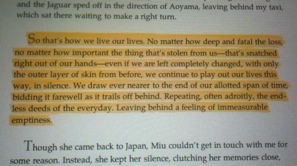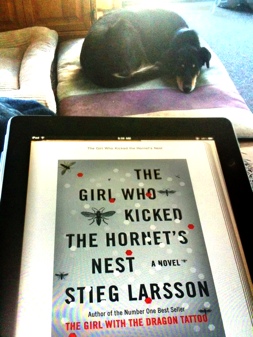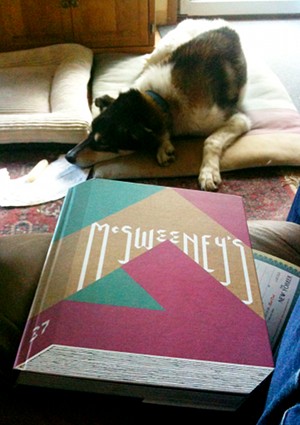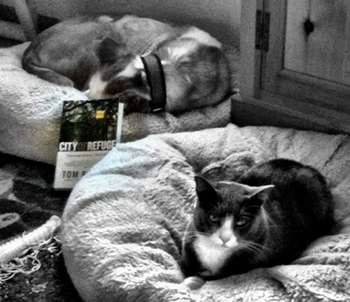Sputnik Sweetheart is a book about loneliness. There are three main characters, including the narrator who is in love with one of the women in the story. She is in love with the other woman in the story, who can no longer love at all after losing half of herself atop a ferris wheel in Switzerland. If that sounds strange, well, it’s Murakami.
It’s a short book, slow moving, but very captivating. Cats appear and disappear, and there’s even a dog or two. But loneliness is the primary emotion. This section reminds me of a Buffy episode where a girl actually does disappear because no one pays any attention to her:
But past a certain point nobody talked to me anymore. No one. Not my husband, my child, my friends . . . no one. Like there was nothing left in the world to talk about. Sometimes I feel like my body’s turning invisible, like you can see right through me.
Good book. Maybe not Murakami’s best, but very enjoyable.
The Girl Who Kicked the Hornet’s Nest is the third book in Stieg Larsson’s Millennium Trilogy. If you’ve read and enjoyed the previous two books, you will enjoy this one as well. Like the others, once you get into it, it is difficult to put the book down.
It’s not great literature, and there are hard to overlook flaws (anytime an interesting woman appears, there is a good chance the main character will eventually sleep with her), but it sure was fun to read. I’m looking forward to watching the movie.
This was the first book I read electronically, on an iPad and iPhone. I didn’t think I’d like this as much as I did, and will likely read a lot of books this way in the future. The only limiting factor for me is that most electronic books include Digital “Rights” Management (DRM) encryption, which means that it is a real hassle (and is probably even illegal in the U.S.) to convert these books into formats that can be read on different sorts of eBook readers. I don’t like the idea of buying something that I can only read on a particular device or software package because the support for that system could easily disappear in the future. Plus, if you buy books from multiple different sources, you have to have a different reader for each of them. For now, I will probably only purchase books using formats without DRM, or with DRM that is easily circumvented (like the Kindle format, for example).
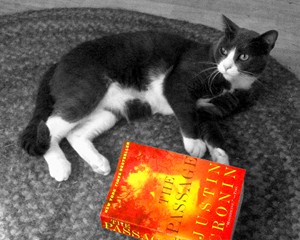
The Passage, Jenson
I’d read a few gushing blurbs about The Passage, Justin Cronin’s long novel (the first in a trilogy, apparently), when it came out last year, but I wasn’t particulary excited about reading “The Stand meets The Road plus vampires.”
But, there it was in the new paperback section of the bookstore last weekend, so I picked it up. I’m glad I did. It really is a great literary summer read: great writing, propulsive plot, lots of thrilling moments. Once I started reading it, I couldn’t put it down, and I’m very much looking forward to the next book. Lots of hair-raising moments like this one:
Wolgast could stand it no more. “What’s over?”Lear lifted his face; his eyes were full of tears.“Everything.”
If you’re looking for something both well written and exciting to read this summer, check it out.
I took some time out from David Foster Wallace’s The Pale King to read the latest McSweeney’s Quarterly Concern, Issue 37, packaged as a hardcover book which has been decorated and trimmed to give the illusion of, yep, a hardcover book. Leave it to McSweeney’s to produce yet another cool, well-produced (sewn binding, actual cloth cover) object containing some great writing.
Favorites in this issue include Jess Walter’s Statistical Abstract for My Hometown, Spokane, Washington, John Hyduk’s great story (essay?) about being unemployed (which has the great image of a warehouse building at night: “It’s dark and raining, but the building glows like a birthday cake”), and Joe Meno’s Lion’s Jaws. I didn’t really get into the five stories from Kenya, but I guess they were interesting from the standpoint of reading within a totally different place and culture.
In late August 2005, Hurricane Katrina struck New Orleans, destroying the levees designed to protect the city, flooding 80% of it, and killing 1,464 people. City of Refuge, written by the author of Why New Orleans Matters and a resident of the city, is a fictional retelling of the disaster and it’s aftermath. It’s an emotional story, well written, and does a good job of making New Orleans and the devastation of Katrina real. Read next to Dave Egger’s Zeitoun, it’s hard to imagine how the maintenance of the levees, emergency response, and relief efforts could have been worse. Thankfully, book mostly stays clear from making political arguments or assigning blame, focusing mainly on how two different families cope with the destruction of the city they lived in.
I enjoyed it—learning more about the disaster and the rhythms and flavor of the city itself—but I wouldn’t recommend it except for readers interested in another perspective on Katrina.
